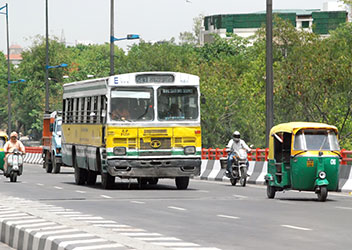Improving City Bus Systems in India
Ravi Gadepalli and Shilpa Kharwal, December 21, 2016
An efficient public transport system is a key pre-requisite for the sustained development of a city. It helps citizens to meet their travel needs in an economical, safe and energy efficient manner. However, cities in India have not invested adequately in developing good quality public transport systems. Only 63 of the 458 Indian cities with more than 100,000 inhabitants have a formal city bus system. Within this, 15 cities also have a bus or rail based mass rapid transit system. Even where cities have formal public transport systems, the level of investment support is limited to intermittent efforts in augmenting capacities and covering funding backlogs of bus operators. Many cities lack sustained institutional and financial support to strengthen their bus systems. As a result, most cities have witnessed a deterioration in the capacity and quality of their bus services. Such inadequacies are being partially addressed by informal Intermediate Public Transport (IPT) services like taxis, informal shared auto-rickshaws providing shuttle services, school buses and chartered bus services.
At the same time, cities continue to build wider roads, flyovers and expressways. This has provided short-term relief from congestion. But on the flip side, they induce people to use private modes like cars and two-wheelers, which leads to more congestion, fuel consumption and air pollution. Clearly, more cars on the road are not a sustainable solution in the long run. A better opportunity is to build better and high quality public transport services that meet India’s developmental and environmental objectives. Given their low costs per passenger, flexibility in operations and ease in implementation, bus systems provide the best solution for India to scale up public transport systems across all Cities.

Summary of Cities and Bus systems reviewed in the study
In line with this assessment, the Shakti Sustainable Energy Foundation, in partnership with Delhi Integrated Multi-Modal Transit Systems (DIMTS) Pvt. Ltd., recently carried out a comprehensive review of the existing performance of bus systems in India to understand their current drawbacks and identify a roadmap for their improvement. The study covers city bus systems in 12 cities of varying population sizes, geographic locations and level of progressiveness of bus systems (see figure below for more details). Data regarding the operational and financial characteristics of these bus systems has been analysed to understand their comparative performance. The study also carried out detailed interactions with the senior management of these organisations to identify the existing gaps in their practices and the key barriers faced in addressing them.
The key gaps identified in the operations, planning and management of the bus systems are classified into six key areas: strategic planning, supporting infrastructure, financing, use of technology, operational efficiency and institutional frameworks. The lack of long-term strategic planning and adequate financing is observed as a key gap area across all the cities. As a result, all the cities are observed to have a shortage in the bus fleet required to meet their mobility needs. On the remaining categories, cities are observed to be at varying levels of efficiency. While cities like Bengaluru and Ahmedabad are working towards installing state of the art Intelligent Transport Systems (ITS) to improve their services, cities like Kanpur and Raipur are struggling to put all their buses in operation due to lack of adequate staff for management. The Institutional framework within which the buses operate has an impact on their operations. The city buses managed as a part of the State Road Transport Undertakings (STU) are given a lower priority compared to the STUs’ inter-city operations. At the same time, the city buses managed by Special Purpose Vehicles (SPV) created specifically for city operations suffer from a shortage in technical and financial capacity to manage bus systems. Additionally, specific gaps in issues like Management Information Systems (MIS), fleet and crew management, human resources, fare mechanisms and data analytics of each of the cities have also been identified.
The study has developed a roadmap to address these gaps. This includes short, medium and long term measures that are needed to revitalize the bus systems in Indian cities. The short to medium term recommendations provided to the cities involve specific solutions to address the existing gaps through adoption of National and International best practices. The longer-term solutions will need a more comprehensive approach that covers all aspects of planning, operations and management of city bus systems. Therefore, the development of a long-term vision and a business plan to achieve it is recommended to be taken up by all bus operating agencies. In addition to the improvements needed by the bus operators, the enabling policy and regulatory reforms to be taken up by the concerned National, State and City level Government authorities have been identified. The report has also identified various areas of intervention where leadership and innovations can be sourced from independent think tanks, research groups and start-ups working on the subject.
Improving city bus systems is a key enabler in achieving the urban development vision of India and will need sustained institutional and political support at various levels of Governance.
The full report can be downloaded at the following link: https://shaktifoundation.in/initiative/developing-roadmap-improving-city-bus-systems/
Read the published article here: http://www.thehindu.com/todays-paper/tp-features/tp-propertyplus/How-to-improve-city-bus-systems/article16878761.ec
